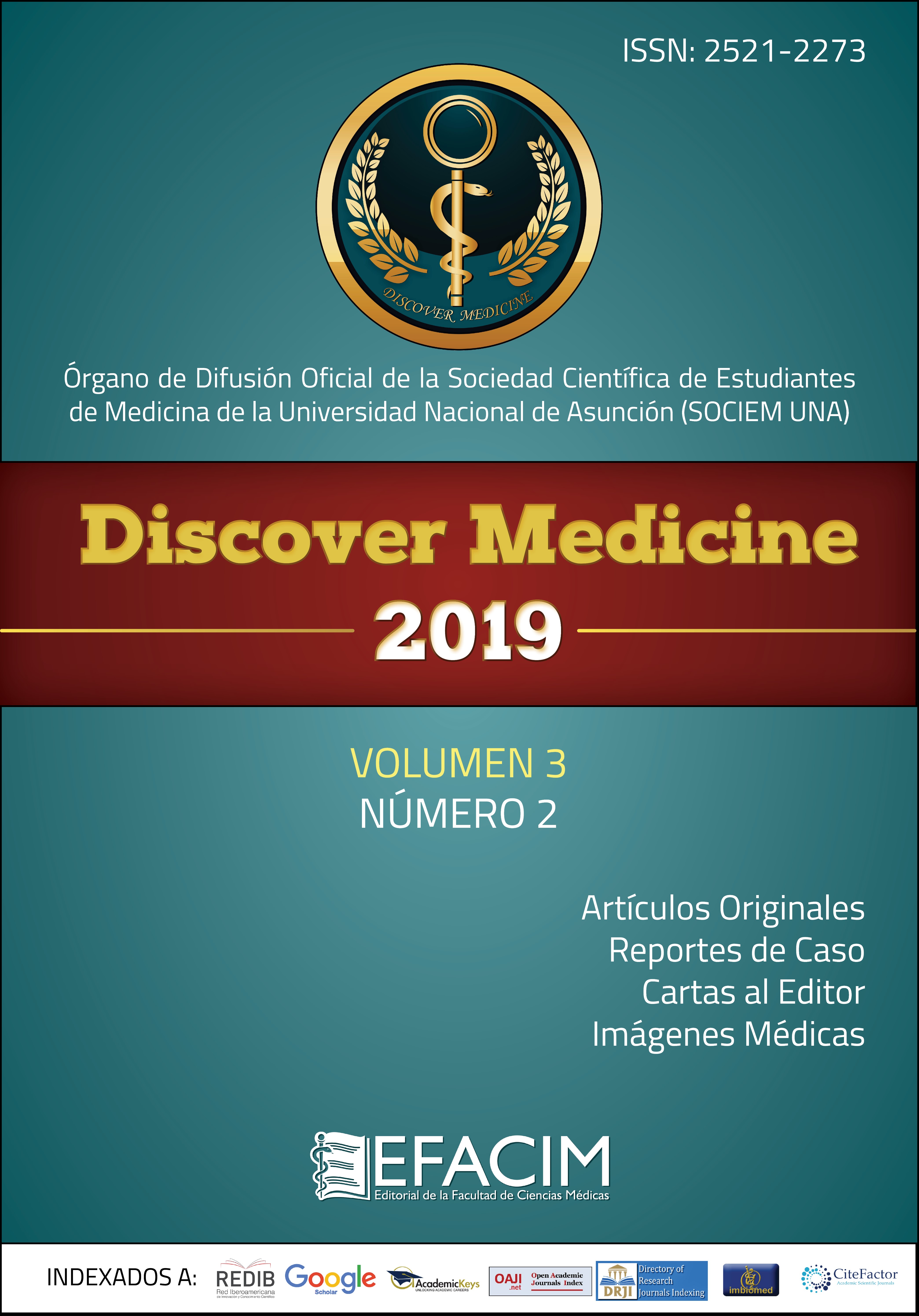Abstract
Background: Asperger’s Syndrome (AS) is a little known and difficult to diagnose condition. It is defined as a rare developmental disorder, characterized by a severe deficit in social relationship, which arises in childhood, persisting into adulthood.
Methods: The design was cross-sectional descriptive observational, an anonymous, voluntary and self-administered survey of
closed questions was applied to 65 students from the clinical career of the Universidad del Pacifico in 2018. Descriptive statistics was applied and it was used the Epi_Info V7 program.
Results: The average age of the 65 students was 22.64 ± 2.2, 72.31% were female, and 40% were in the 4th year. On the level
of knowledge about Asperger’s disease we observed that 81.54% was good.
Conclusion: The data previously exposed show a good general level of knowledge on the part of the students surveyed of the clinical cycle, but some shortcomings in the moment of diagnosis and treatment of these patients.
References
Hahn C. Que es Asperger [Internet]. Asperger.cl. 2000 [cited 2017 Sep 15]. Disponible en: http://www.
asperger.cl/
Martínez del Rio C. El síndrome de Asperger. Cuad Pedagog [Internet]. 2005;(344):38–41. Disponible
en: http://dialnet.unirioja.es/servlet/extart?codigo=1098648
Carlón MIV, Rodríguez AI. Una puerta abierta a la inclusión en la Universidad: Experiencia con un alumno
Erasmus con Síndrome de Asperger. Rev Educ Inclusiva [Internet]. 2015; 8(1):104–14. Disponible en: http://www.revistaeducacioninclusiva.es/index.php/REI/article/view/123
Gómez M, Guerrero J, Olivencia L. Análisis de la inclusión socioeducativa de jóvenes con síndrome de
asperger: un estudio cualitativo. IJERI: International Journal of Educational Research and Innovation, 0(8),
-127. Disponible en: https://www.upo.es/revistas/index.php/IJERI/article/view/2346
Rangel A. Orientaciones pedagógicas para la inclusión de niños con autismo en el aula regular. Un
apoyo para el docente. Revista de Estudios Interdisciplinarios
en Ciencias Sociales Vol. 19, No. 1 (2017).
-102.
Pérez Rivero PF, Martínez Garrido LM. Perfiles cognitivos en el Trastorno Autista de Alto Funcionamiento
y el Síndrome de Asperger. Rev CES Psicol [Internet]. 2014; 7(1):141–55. Disponible en: http://revistas.ces.
edu.co/index.php/psicologia/article/view/2693%5Cnhttps:// www.scribd.com/doc/260426306/v7n1a12
Anchante Bejarano G, Burgos Ugaz LM, Tarazona Ramos SE, Ahumada Ledesma E. Conocimiento sobre
autismo y cuidados del niño en una asociación de padres de familia. Rev Enfermería Hered [Internet].
; 1(1):3–10. Disponible en: http://www.upch.edu.pe/faenf/images/pdf/Revistas/2008/enero/
v1n1ao1.pdf
Arangure L. BIBLIOTECA OCTAVIO ARIZMENDI POSADA UNIVERSIDAD DE LA SABANA Chía - Cundinamarca.
Tesis [Internet]. 2013; 103. Disponible en:http://intellectum.unisabana.edu.co:8080/jspui/bitstream/10818/10409/1/Lina Maria Arangure Burgos(TESIS).pdf
Martínez-Cayuelas E, et al. Nivel formativo sobre trastornos del espectro autista (TEA) entre los pediatras
de atención hospitalaria. An Pediatr (Barc). 2016. Disponible en: http://dx.doi.org/10.1016/j.
anpedi.2016.05.005.
Pérez Martínez V, Alfonso Montero O. Necesidades de aprendizaje de los especialistas de Medicina
General Integral sobre los trastornos del espectro autista. Revista Cubana Medicina General
Integral ; 29( 3 ): 267-280. Disponible en: http://scielo.sld.cu/scielo.php?script=sci_arttext&pid=S0864-21252013000300005&lng=es.
Silvestre C, Belisásio F, Ferreira J, y Triguero MC. ¿Estudiantes de psicología concluyen la graduación
con una buena formación en autismo? Psicología: Teoría y Práctica, 18 (1), 206-221. Disponible en:
http://pepsic.bvsalud.org/scielo.php?script=sci_arttext&pid=S1516-36872016000100016&lng=es&tlng=es.
Lüleci N, Hidiroglu S, Karavus M, Celik S, Cetiner D, Koc E, Kasikci T, Sadirvan Y, Karavus A, Topuzoglu
A. A study exploring the autism awareness of first grade nursing and medical students in Istanbul, Turkey.
Journal of the Pakistan Medical Association Vol. 66, No. 8: 916-21.
Wilson K, Chasson G, Jozkowski A, and Mulhern M. “Impact of a Pre-Professional Clinical Education Experience with Adults with Autism Spectrum Disorder: Preparation of Future Speech-Language Pathologists,” Teaching and Learning in Communication Sciences & Disorders: Vol. 1: Iss. 2, Article 5. Available at: http://ir.library.illinoisstate.edu/tlcsd/vol1/iss2/5

This work is licensed under a Creative Commons Attribution-NonCommercial-NoDerivatives 4.0 International License.
Copyright (c) 2023 María Paz Gill Centurión, Luciana Daniela Garlisi Torales, Sylvana Magalí Baruja Villalba, Gabriel Osmar Delgado Centurión, Nair Goncalvez Adorno, Alejandro Kaleniuszka Chena, Johanna Magali Coronel Ocampos
